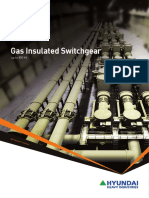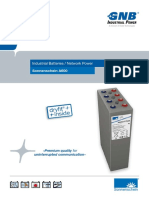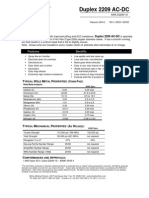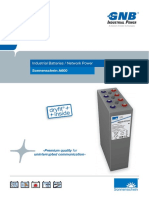Royal Battery4
Royal Battery4
Uploaded by
AbdallahCopyright:
Available Formats
Royal Battery4
Royal Battery4
Uploaded by
AbdallahOriginal Title
Copyright
Available Formats
Share this document
Did you find this document useful?
Is this content inappropriate?
Copyright:
Available Formats
Royal Battery4
Royal Battery4
Uploaded by
AbdallahCopyright:
Available Formats
2 Samantha Street, Strijdom Park, Randburg, Johannesburg, 2194
Tel: (+27) 11 886-7874 | Fax: (+27) 11 787 0178
Sinetech sales@sinetech.co.za | www.sinetech.co.za
Advanced Power Products
LEAD CALCIUM SEMI-SEALED
MAINTENANCE FREE BATTERY
ROYAL The Royal calcium battery is a general purpose semi-sealed
battery with a design life up to 3 - 5 years in standby use.
FEATURES: APPLICATIONS:
• Complete protection against reduction of sulfuric acid • UPS BACK-UP SYSTEMS
• Preventing electrolyte losses by collecting and returning liquid to the reservoir • INVERTER BACKUP SYSTEMS
• Consistent starting performance
• INDUSTRIAL BACKUP SYSTEMS
• High durability achieved by adoption of special wrought lead calcium grids
• MARINE
• Low resistance envelope separator
• Extremely low rate of self discharge
Nominal Reserve Cold cranking
Capacity Nominal Capacity Height Length Width Weight Terminal
Model Amps @ (mm) (Approx.kg)
(20hr/ah) Voltage (Minutes) (mm) (mm) Type
- 18°C
NS40 35 12 52 310 230 200 135 9.54 SAE Post
NS60 45 12 75 325 230 240 135 11.52 SAE Post
NS70 65 12 110 550 230 265 190 16.86 SAE Post
56637K 65 12 110 550 175 275 175 16.08 SAE Post
1150K 105 12 180 625 240 335 175 24.78 10mm Stud
N150 150 12 300 900 230 510 220 41.5 SAE Post
N200 200 12 430 1000 245 520 280 55.7 SAE Post
NS40 NS60 NS70 N150 & N200
1150K
DESCRIPTION
Royal batteries uses specially alloyed lead-calcium which allows extremely low levels of “electrolyte decrease”.
Therefore there is no need to supplement distilled water if the charging system remains error free. Special liquid-gas separators keep the electrolyte
inside. An electrolyte is any substance containing free ions that behave as an electrically conductive medium. These separators are also used between
the positive and negative plates of a lead acid battery to prevent a short circuit through physical contact. No filler caps are required and there is therefore
no electrolyte contamination, over watering or damage in use. Unique wrought lead-calcium grid design means less internal corrosion and efficient
current conductivity for more power and longer life. It also cuts gassing, resists overcharge, heat and thermal runaway.
TERMS AND RATINGS
Cold cranking amperes (CCA) is the amount of current a battery can provide at 0 °F (-18 °C). The ratings defined as the current a lead-acid battery at
Model
that temperature can deliver for 30 seconds and maintain at least 1.2 volts per cell (7.2 volts for a 12-volt battery). It is a more demanding test than those
at higher temperatures.
Hot cranking amperes (HCA) is the amount of current a battery can provide at 80 °F (26.7 °C). The rating is defined as the current a lead-acid battery at
that temperature can deliver for 30 seconds and maintain at least 1.2 volts per cell (7.2 volts for a 12-volt battery).
Reserve capacity minutes (RCM), also referred to as reserve capacity (RC) is a battery’s ability to sustain a minimum stated electrical load. It is defined
as the time (in minutes) that a lead-acid battery at 80 °F (27 °C) will continuously deliver 25 amperes before its voltage drops below 10.5 volts.
The hydrometer measures the density and therefore indirectly, the amount of sulfuric acid in the electrolyte. A low reading means that sulfate is bound to
the battery plates and that the battery is discharged. Upon recharge of the battery, the sulfate returns to the electrolyte.
2 Samantha Street, Strijdom Park, Randburg, Johannesburg, 2194
Tel: (+27) 11 886-7874 | Fax: (+27) 11 787 0178
Sinetech sales@sinetech.co.za | www.sinetech.co.za
Advanced Power Products
DEEP-CYCLE ROYAL MARINE SERIES
ROYAL The Royal calcium battery is a general purpose semi-sealed
battery with a design life up to 3 - 5 years in standby use.
FEATURES: APPLICATIONS:
• Low - Resistance envelope separators • UPS Back-Up Systems
• Flame arrester • Inverter Backup Systems
• Hydrometer
• Industrial Backup Systems
• Heat-Sealed covers
• Marine
• Polypropylene case
• Wrought lead calcium grids
• Centered cast-on plate straps
• Exclusive patented liquid gas separator
BCI Nominal Reserve Cranking
Catalogue Capacity Nominal Capacity Height Length Width Weight Terminal
Group Amps @
Number (20hr/ah) Voltage (Minutes) (mm) (mm) (mm) (Approx Type
Size 0°C kg)
24 DC24 70 12 275 620 (MCA) 229 275 172 20.3 SAE Post & Wing Nut
27 DC27 80 12 320 720 (MCA) 229 320 172 23.7 SAE Post & Wing Nut
31 DC31 100 12 110 790 (MCA) 234 330 172 27 SAE Post & Wing Nut
Battery Council International (BCI) Trade organization of lead-acid battery manufacturers.
Cranking amperes (CA), also sometimes referred to as marine cranking amperes (MCA), is the amount of current a
battery can provide at 32°F (0°C).
HOW TO RECHARGE:
The battery is an energy storage device. When energy is removed from the battery it must be put back by recharging. The amount of energy to be
replaced depends on how much was taken out. The recharge time depending on the output ampere and type of charger. The Delkor Royal Marine and
Deep Cycle battery has a built-in state-of-charge indicator to show how much energy is left in the battery. A green coloured ball or black coloured ball
may be visible in the indicator.
BATTERY CONNECTIONS:
Automotive batteries typically have different types of terminals. The most common design is the SAE Post, consisting of two lead posts in the shape of
truncated cones, positioned on the top of the battery, with slightly different diameters to differentiate between plus and minus.
SAE Post Clamp SAE Post & Wingnut 8mm Screw 10mm Stud/Nut
Terminal
GP121000
HOW TO HANDLE AND STORE BATTERIES:
Batteries should be stored in cool, dry (15 - 27 °C) places and out of direct sunlight (make sure the battery is fully charged). Delkor Royal batteries are
tightly sealed to prevent acid leakage. However tilting the battery to an angle of 45 degrees or more can cause acid to leak through the over pressure
relief vents on the sides. Batteries should therefore always be stored in their upright positions. Prevent placing any aqueous or solid (i.e. Conductors
such as Screwdrivers, Spanners, Links, etc.) bodies on top of the battery. It is extremely dangerous to use tools such as hammers, on the battery
terminals when connecting cables to the mounted battery. Use only the correct isolated tools and spanners. When storing the battery for long periods of
time, check the voltage of the battery every 6 months. If the voltage (OCV) drops below 12.5V, recharge the battery before placing it back in storage.
Check the hydrometer periodically on stored batteries. If 1 or 2 of the indicators appear black, recharge the battery immediately.
You might also like
- VEGA - Indonesia PresentationDocument62 pagesVEGA - Indonesia PresentationSteve WanNo ratings yet
- Advances in Mud Gas Interpretation Whilst DrillingDocument12 pagesAdvances in Mud Gas Interpretation Whilst Drillinglakhanmukhtiar100% (1)
- Coiled Tubing: State of The Industry and Role For NETL: June, 2005Document32 pagesCoiled Tubing: State of The Industry and Role For NETL: June, 2005Greg AndersonNo ratings yet
- SBS Royal Battery BrochureDocument4 pagesSBS Royal Battery BrochureJWAL SystemsNo ratings yet
- Hyundai Heavy Industries - Gas Insulated SwitchgearDocument25 pagesHyundai Heavy Industries - Gas Insulated SwitchgearbadbenzationNo ratings yet
- We en Web in Ar Sic Mosfet 1638931895460Document29 pagesWe en Web in Ar Sic Mosfet 1638931895460AlexxisNo ratings yet
- GNB Sonnenschein A600 enDocument16 pagesGNB Sonnenschein A600 enASMAA MAROUFNo ratings yet
- Baterias Nickel HBLDocument2 pagesBaterias Nickel HBLannymagoNo ratings yet
- DC12 250A UnitecDocument2 pagesDC12 250A Uniteccomercial2biosolarenergyNo ratings yet
- High Voltage 2xs FL 2y A2xs FL 2y 110kv Power Cable 1Document3 pagesHigh Voltage 2xs FL 2y A2xs FL 2y 110kv Power Cable 1SanalicaNo ratings yet
- Us-Ecm-Ps-Aa 0816Document4 pagesUs-Ecm-Ps-Aa 0816Junior Ramirez ReyesNo ratings yet
- Bomba Gould Sumergible para Aguas NegrasDocument4 pagesBomba Gould Sumergible para Aguas NegrasNick OchoaNo ratings yet
- 615 RseriesDocument7 pages615 Rseriesmohamed saadaNo ratings yet
- LP12-200 - LP SERIES - VRLA AGM Battery - Multi-Purpose Series.4b23d6Document2 pagesLP12-200 - LP SERIES - VRLA AGM Battery - Multi-Purpose Series.4b23d6Uros DrazicNo ratings yet
- HBL VRLA Technical ManualDocument24 pagesHBL VRLA Technical ManualRamaKrishna ANo ratings yet
- RSEL Series: 0.5A To 6A, 250VAC EMI FiltersDocument2 pagesRSEL Series: 0.5A To 6A, 250VAC EMI FiltershdxfNo ratings yet
- LP12-200 VRLA AGM BatteryDocument2 pagesLP12-200 VRLA AGM BatteryandrejatemerinNo ratings yet
- EL EL EL EL Elastimold Astimold Astimold Astimold Astimold: 15kV Loadbreak Reducing Tap Plug 650ETPDocument2 pagesEL EL EL EL Elastimold Astimold Astimold Astimold Astimold: 15kV Loadbreak Reducing Tap Plug 650ETPJonnyRcNo ratings yet
- 10 Opzv 1000: SpecificationsDocument2 pages10 Opzv 1000: Specificationsthiago Eng. ThiagoNo ratings yet
- Epp1930 10 11 - IecDocument8 pagesEpp1930 10 11 - Iecmaxichavez29No ratings yet
- Industrial Batteries / Network Power: Sonnenschein A600Document16 pagesIndustrial Batteries / Network Power: Sonnenschein A600iamlpNo ratings yet
- 2 V VRLA Tec. Manual (Exports) PDFDocument24 pages2 V VRLA Tec. Manual (Exports) PDFp41005679No ratings yet
- Batteries VRLA Triumph - HBL-completoDocument24 pagesBatteries VRLA Triumph - HBL-completoHarry RincónNo ratings yet
- Marine Battery Training Guide: How To Select, Install and Maintain A Marine BatteryDocument8 pagesMarine Battery Training Guide: How To Select, Install and Maintain A Marine BatteryMarco Antonio Miranda RodriguezNo ratings yet
- (GIS) 36kV - Catalog - EN - 201709Document24 pages(GIS) 36kV - Catalog - EN - 201709Nazmul HasanNo ratings yet
- E 2209 AcdcDocument2 pagesE 2209 AcdcLuis Alejandro Gonzalez SantanaNo ratings yet
- TENSITE-AGM-12-35 Bateria Panel SolarDocument3 pagesTENSITE-AGM-12-35 Bateria Panel SolarANA LISBETH VILLARREYES AVILANo ratings yet
- SonnenscheinGEL PDFDocument12 pagesSonnenscheinGEL PDFLeah HicksNo ratings yet
- Goldeniso BrochureDocument10 pagesGoldeniso BrochureJose Ramon Rivas MoralesNo ratings yet
- SV Series - Special Medium Voltage Leaded Varistors: DescriptionDocument4 pagesSV Series - Special Medium Voltage Leaded Varistors: DescriptionIgor PNo ratings yet
- VAsuperior ENGDocument24 pagesVAsuperior ENGaloisioNo ratings yet
- 2V Lse Series Vrla Battery: SpecificationsDocument2 pages2V Lse Series Vrla Battery: Specificationschee wyNo ratings yet
- SMG Opzv: Applicable Standards Applications and Key Benefi TsDocument2 pagesSMG Opzv: Applicable Standards Applications and Key Benefi TsvladalucarDNo ratings yet
- fhlr2gcb2g CableDocument2 pagesfhlr2gcb2g CableBalashiv KumaranNo ratings yet
- Battery CatalogueDocument6 pagesBattery CataloguerantaroNo ratings yet
- Brochure Baterias SonnenscheinDocument16 pagesBrochure Baterias SonnenscheinJorge GarciaNo ratings yet
- High Voltage 2xs FL 2y A2xs FL 2y 123kv Power CableDocument3 pagesHigh Voltage 2xs FL 2y A2xs FL 2y 123kv Power CableShailendra Kumar VermaNo ratings yet
- Classic Rotary Switch Range 2020 v1Document19 pagesClassic Rotary Switch Range 2020 v1Dave PotterNo ratings yet
- TT - Electronics 898 3 R100K Datasheet PDFDocument4 pagesTT - Electronics 898 3 R100K Datasheet PDFelnegritoheberNo ratings yet
- GNB - Marathon - M - FT - EN - BatteryDocument16 pagesGNB - Marathon - M - FT - EN - Batterysajeevanreshma07No ratings yet
- SP GNB Absoltye IIP RackDocument4 pagesSP GNB Absoltye IIP RackAlfredo ApNo ratings yet
- MetalOVD2 16 OptDocument16 pagesMetalOVD2 16 OptInajá FerreiraNo ratings yet
- Welding Processes Welding KnowledgeDocument85 pagesWelding Processes Welding KnowledgeIshtiaqNo ratings yet
- Sonnenschein SOLAR BLOCKDocument7 pagesSonnenschein SOLAR BLOCKCalincit0No ratings yet
- SIAPRA OPzV enDocument2 pagesSIAPRA OPzV enAsher KhanNo ratings yet
- BrochureDocument16 pagesBrochureNITIN EPPALPALLINo ratings yet
- انواع القواطع وتركيباتها الداخليهDocument50 pagesانواع القواطع وتركيباتها الداخليهHesham GamalNo ratings yet
- Eterna CW: Kirloskar Brothers LimitedDocument2 pagesEterna CW: Kirloskar Brothers Limitedudiptya_papai2007100% (2)
- 1.1 Daelim Pad Mounted TransformerDocument12 pages1.1 Daelim Pad Mounted Transformeralcibiades romeroNo ratings yet
- OPzV 2500Document2 pagesOPzV 2500JORGE ALBERTO URIBE DAZANo ratings yet
- Stelmec VCBDocument2 pagesStelmec VCBnithinmundackal3623No ratings yet
- 147-168 62gb Series 62GB-57A14-15SNDocument22 pages147-168 62gb Series 62GB-57A14-15SNwiradesNo ratings yet
- Training Material WEDA PumpsDocument73 pagesTraining Material WEDA PumpsКонстантин ГетьманNo ratings yet
- Pinnacle Alloys E7018 E7018 1Document2 pagesPinnacle Alloys E7018 E7018 1BerniIrleNo ratings yet
- 2035 XX SMDocument3 pages2035 XX SMDDAANNIIEELLNo ratings yet
- GNB Marathon M FT en July20Document16 pagesGNB Marathon M FT en July20David MonederoNo ratings yet
- You Asked. Listened.: S0 & S1 RangeDocument12 pagesYou Asked. Listened.: S0 & S1 RangePutri Nur Ayu AmaliaNo ratings yet
- Vrla Range: Technical FeaturesDocument6 pagesVrla Range: Technical FeaturesFahri AdrianNo ratings yet
- Lafonte Ytaly Machine Recovery Gold SGQT Su DungDocument2 pagesLafonte Ytaly Machine Recovery Gold SGQT Su DungGIAP VAN MATNo ratings yet
- Polycab IS 9968-1 CatalogDocument27 pagesPolycab IS 9968-1 CatalogSanthosh V RNo ratings yet
- Weld Like a Pro: Beginning to Advanced TechniquesFrom EverandWeld Like a Pro: Beginning to Advanced TechniquesRating: 4.5 out of 5 stars4.5/5 (6)
- VP Inverter-Axpert VM II 6kw ElitaDocument1 pageVP Inverter-Axpert VM II 6kw ElitaAbdallahNo ratings yet
- CSB Datasheet GP12170 - 053124Document2 pagesCSB Datasheet GP12170 - 053124AbdallahNo ratings yet
- CSB Datasheet HRL1280W - 053126Document2 pagesCSB Datasheet HRL1280W - 053126AbdallahNo ratings yet
- SolarDocument1 pageSolarAbdallahNo ratings yet
- GoodDocument2 pagesGoodM Saad GhoryNo ratings yet
- Food Loss and Food Waste: A Literature Review in 2009-2018Document22 pagesFood Loss and Food Waste: A Literature Review in 2009-2018Pari KadamNo ratings yet
- Catalogo de Producto HFCF PDFDocument12 pagesCatalogo de Producto HFCF PDFJhon Edinson Blanco GomezNo ratings yet
- Gas Pressure Switch DG - TechinfoDocument31 pagesGas Pressure Switch DG - TechinfoUthman MohammedNo ratings yet
- Cementing OverviewDocument40 pagesCementing OverviewImanossNo ratings yet
- Stainless Steel Grade 304 (UNS S30400)Document4 pagesStainless Steel Grade 304 (UNS S30400)105034412No ratings yet
- 1 s2.0 S0016236122041771 MainDocument10 pages1 s2.0 S0016236122041771 Maintask51.hevtcpNo ratings yet
- Actuator TorqDocument16 pagesActuator TorqSEPTADONAI TRISNANo ratings yet
- Inst AMI Deltacon Power v.4.12 EngDocument92 pagesInst AMI Deltacon Power v.4.12 EngMaxi MaxiNo ratings yet
- Stromlaufplan ECM M797 PDFDocument18 pagesStromlaufplan ECM M797 PDFsorcerNo ratings yet
- Denmark As A Circular Economy Solution HubDocument24 pagesDenmark As A Circular Economy Solution HubLakatos SiminaNo ratings yet
- 9 Flow in Pipes - With FiguresDocument59 pages9 Flow in Pipes - With FiguresCarlos SerranoNo ratings yet
- Tab Motion 190p 250a 12vDocument4 pagesTab Motion 190p 250a 12vJavier Izaguirre CarbonellNo ratings yet
- Gascalc 5.0: Calculation ReferenceDocument46 pagesGascalc 5.0: Calculation ReferenceCésar Sandoval100% (1)
- GAD CondenserDocument1 pageGAD CondenserEdensonNo ratings yet
- 70ZV 2 BrochureDocument12 pages70ZV 2 BrochurepedrofalfanNo ratings yet
- Model-7 (1-4)Document23 pagesModel-7 (1-4)Sayyed FaqruddinNo ratings yet
- AlfaNova 27Document2 pagesAlfaNova 27Celio CostaNo ratings yet
- IMS BrochureDocument11 pagesIMS BrochureDante DantemoNo ratings yet
- Design Projects 4 Project Design Specifics: Steam Cracking Furnaces, Gas Treatment and Steam SystemDocument11 pagesDesign Projects 4 Project Design Specifics: Steam Cracking Furnaces, Gas Treatment and Steam SystemnNo ratings yet
- OPFLOCooler Lit 2012Document6 pagesOPFLOCooler Lit 2012Bảo Phan HoàiNo ratings yet
- v12 Can4 MercedesDocument2 pagesv12 Can4 Mercedesecupro checoNo ratings yet
- Daikin - Refrigeration - Malaysia - AHU - File gốcDocument26 pagesDaikin - Refrigeration - Malaysia - AHU - File gốcPhuNguyenHoangNo ratings yet
- Advantages and Disadvantages of Solar EnergyDocument3 pagesAdvantages and Disadvantages of Solar Energyrubenmariadasan100% (4)
- Market Analysis & Literature Review RDFDocument66 pagesMarket Analysis & Literature Review RDFDewi HadiwinotoNo ratings yet
- Technical Data Submittal Document: Project: Customer: Engineer: Pump ManufacturerDocument7 pagesTechnical Data Submittal Document: Project: Customer: Engineer: Pump Manufacturerfouad.abo.hussien1998No ratings yet
- CAT 3408-3412 ManualDocument91 pagesCAT 3408-3412 ManualWilmar Rojas96% (53)
- Data Sheet 68570379 Ignition Module IM 3.2Document3 pagesData Sheet 68570379 Ignition Module IM 3.2Antonio GNo ratings yet





























































































